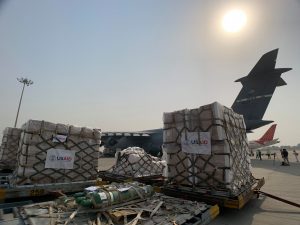A second wave of the COVID-19 pandemic is raging through India. The country is not facing this challenge alone, with help pouring in from across the world. But delivering assistance during this calamity faces a range of daunting challenges. In light of the humanitarian crisis, the Indian government must quickly move to remove policy and regulatory impediments that hamper global assistance.
In mid-March, it became apparent that India was facing a new wave of COVID-19 cases. As the wave took on epic proportions, the global community realized the importance of generating assistance to India. Governments, nongovernment organizations, and the private sector all started to gear up for a major effort to deliver money and supplies. Many of these organizations found India’s regulations were slowing assistance.
Albeit slowly, the government relaxed procurement rules and exempted various items from special health taxes, custom duties, and the integrated goods and services tax (IGST). However, many gaps remain. First, the exemptions are tied to various conditions. There is also a lack of clarity on how the Foreign Contribution Regulation Act (FCRA) rules and exemptions will be reconciled when the entity in question is not a registered nonprofit. Exemptions are also unavailable to individuals and philanthropic organizations that utilize a commercial vendor for imports. Also, many items that maybe sent for COVID-19 related relief are not necessarily included in the short exemptions list. Personal protective equipment or PPE, and many drugs being used to reduce COVID-19 symptoms are not included.
Perhaps the biggest impediment is the latest amendments to India’s Foreign Contribution Regulation Act, 2020. India’s FCRA regime regulates the acceptance and use of foreign contributions by Indian nonprofits. The government has increased enforcement of the FCRA in recent years, as seen in the declining trend of yearly FCRA approvals and increasing FCRA registration cancellations. Philanthropy Report 2019 estimates that foreign funding to Indian nonprofits has declined by nearly 40 percent from 2015 to 2018 owing to such FCRA rigors. In September 2020, amidst a pandemic, the government brought in amendments to the FCRA, further restricting the rules surrounding the receipt and use of foreign contributions. Importantly, the new restrictions disallow sub-granting and mandate foreign contributions be received only through a specific bank account in the State Bank of India (SBI).
Most nonprofits did not have an SBI account by the March 2021 deadline. At the time of writing this article, the Ministry of Home Affairs extended the timeline for opening an SBI account for receiving FCRA funds, and the validity of existing registration certificates. However, the sub-granting clause continues to mar relief work by limiting collaboration with on-ground organizations that provide last mile relief – especially critical as the severity of the second wave has permeated to rural India and relief efforts have led to ad-hoc collaborations.
Besides material and cash relief, restrictions exist even on personnel. More than 70,000 foreign medical graduates with degrees equivalent to an MBBS are present in India and willing to intern and/or volunteer. The one roadblock to having all available hands on deck is the foreign graduate medical exam (FMGE). Individuals and organizations wanting to provide personnel support are also pressed for options. With e-visas suspended, only a few categories of e-visas are allowed, and the allowed categories do not capture all categories of international volunteers.
In light of the unprecedented crisis and need to strengthen COVID-19 relief efforts, the government should consider urgent implementation of a few key steps. First, the implementation of the FCRA amendments must be postponed until further notice. If not the entire amendments, then at least the sub-granting restrictions need to be temporarily waived while nonprofits focus their energies on the crisis at hand rather than traversing regulatory land mines. Second, a special e-visa category should be created for volunteers with fast-track visa processing. Third, the FMGE requirement must be waived during the pandemic for foreign medical graduates seeking to intern or volunteer. Fourth, custom duty and IGST exemptions must be ensured to all COVID-19 relief material entering the country and being distributed as a gift. This should be done without conditions and clarity must be provided on areas of non-exemption, if any. For swift clearance, a dedicated customs cell must be created solely for clearing COVID-19 relief material.
Around the world nations are working to strengthen their nonprofits during the pandemic. India should follow suit and use the PM CARES funds to create a nonprofit support package for nonprofits working in rural or remote areas and providing last mile relief. Since PM CARES is free of FCRA compliance in receiving foreign funds, corporate social responsibility eligible, and also provides tax benefits to those donating, it should be used as a platform to create support packages for strengthening and aiding nonprofit work.
As the world comes to India’s aid, regulations and regulatory uncertainty should not derail good intentions and timely actions. The government needs to make it easier to help India.

































